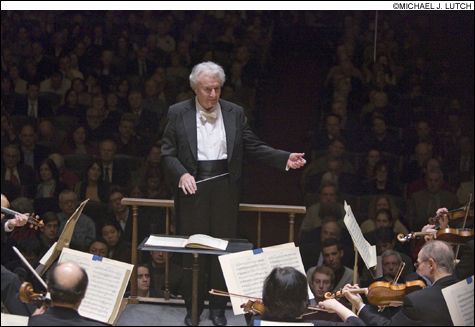
THE DREAM OF GERONTIUS: Sir Colin kept the music rolling forward in great, rich, melodic waves. |
A youthful 80-year-old Sir Colin Davis was back in front of the Boston Symphony Orchestra last weekend with one of the pieces he loves most, Sir Edward Elgar’s vast cantata The Dream of Gerontius. (He led the only other BSO performance, in 1982, when he was 55.) The text is about half of Cardinal John Henry Newman’s 900-line poem about the death of an “old man” (“Gerontius” — as in “gerontology”) and his soul’s journey to Purgatory. In his essay in the BSO program book, Michael Steinberg calls this “spiritual drama . . . the greatest work of sacred music between the Verdi Requiem and Stravinsky’s Symphony of Psalms.”Elgar’s cantata has neither Verdi’s ferocious drama nor Stravinsky’s hieratic purity, though it whispers of both. It’s focused more on an individual’s suffering and redemption. Newman was an Anglican theologian who controversially converted to Catholicism in 1845, a time in England when Roman Catholics were still persecuted. He wrote his long poem 20 years later, and it was an important work for the Catholic Elgar.
“Fervent” perhaps best describes the music. There isn’t a moment that doesn’t sound sincere or like an apt musical counterpart to Newman’s plush Victorian diction (“before the Throne/Stands the great Angel of the Agony,/The same who strengthened Him, what time He knelt/Lone in the garden shade bedewed with blood”). Without rushing, Sir Colin kept the music rolling forward in great, rich, melodic waves, each new climax bigger — and more fervent — than the last, yet never syrupy, and by the end quite moving.
The long Part II post-mortem is more full of incident than the long Part I, which is devoted to the passing away of Gerontius. Tenor Ben Heppner sang firmly despite occasional rough spots, but with rather undifferentiated fervor in expressing his eagerness to have shuffled off his mortal coil, his amazement that his mortal fear has dissolved, his repugnance at the demons eager to drag to Hell the newly departed spirits.
As Gerontius’s guiding angel, British mezzo-soprano Sarah Connolly sang with a kind of rapturous restraint and a vivid, almost conversational but warm-toned projection of Newman’s consoling words. Canadian bass-baritone Gerald Finley, both Priest and Angel of the Agony, had a ringing voice, precise articulation, and, yes, fervor. The orchestra played with full-throated ease, and John Oliver’s Tanglewood Festival Chorus outdid itself, singing — from memory, as usual — the Priest’s “Assistants,” echoes of Gerontius’s mourners, dread demons, and celestial choirs
BMOP has become so popular, you have to look hard in the program to find its full name: Boston Modern Orchestra Project. Founder Gil Rose and his outstanding ensemble celebrated their 10th season at the New England Conservatory on Friday with their annual concert devoted to Boston composers. An enthusiastic and diverse audience (diverse especially in age) cheered, whistled, and hooted its approval for pieces, including two world premieres, by five composers also diverse in age. All the pieces were lively and (unlike Gerontius) fun.
For me, the most satisfying works were by the two oldest composers. Ezra Sims just turned 80, and Rose led the premiere of his 2005 Concert Piece II, in which two solo clarinets (BMOP’s impressive Michael Norsworthy and Amy Advocat) are set off against the rest of the orchestra, echoing and one-upping each other. Sims is the guru of microtonality: his scale has not 12 but 72 pitches per octave! This usually creates a sense of restlessness and uneasiness, so his first-movement label, “Fast and Eager,” is a little surprising. The interplay between the two soloists and between them and the orchestra, especially the winds (like the haunting horn in the slow middle movement), was compelling, and so was Sim’s overall architectural clarity. I was struck, though, by how little dynamic variety there was in the two clarinets — almost no quiet moments. I wish the title were less unmemorably formalistic for such a memorable piece.
Eighty-nine-year-old Leon Kirchner (who now lives in New York, after nearly three decades at Harvard) was represented by an “early” work, Toccata for Strings, Solo Winds, and Percussion (1955). Classicist, expressionist (a student of Schoenberg’s), Kirchner is hard to pin down. He has one of the great “ears.” Even at its most violent, every thread of his music, every contrapuntal line of every rich layer, is audible and (especially in the hushed slow passages) insinuatingly beautiful. Toccata is another formalist title, but as always with Kirchner, there’s a deep and urgent core of complex emotion. Exhilaration is never far from terror — and vice versa. Rose led an exemplary performance.
The winner of the BMOP/NEC composition contest was 28-year-old Israeli composer Oznat Netzer’s brief and ebullient Common Ground, which excels in what Elliott Carter often marks in his own music as “scorrevole” (scurrying). The BMOP/NEC concerto competition winner was the brilliant and uninhibited young violinist from Wyoming, Byron Hitchcock, who appeared in William Bolcom’s brilliant and uninhibited 1983 Violin Concerto, which embraces a slow-movement lamentation for the late pianist Paul Jacobs and an exuberant rondo finale alternating ragtime with R&B. And in Melrose native Michael Gandolfi’s Bassoon Concerto, the BSO’s phenomenal principal bassoonist, Richard Svoboda, who played the world premiere with the Melrose Symphony Orchestra last fall, fulfilled every demand for syncopated playfulness and bravura.